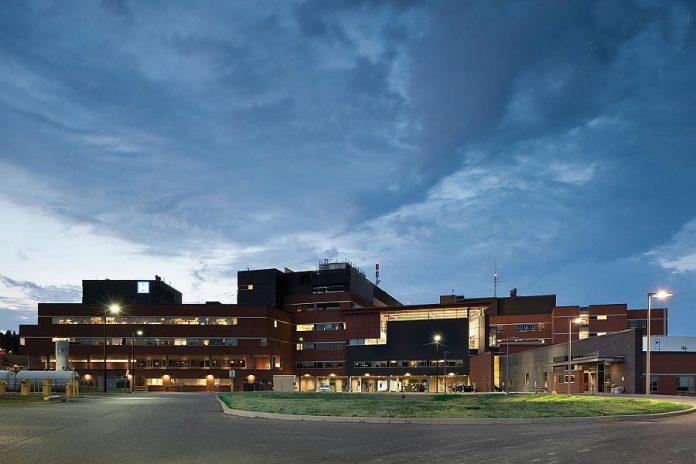
Having accepted a total of 40 patient transfers since early January — 16 of those over the last two weeks — Peterborough Regional Health Centre (PRHC) administrative and medical staff are working to increase critical care capacity while ramping down non-urgent care to provide for their care.
“Over the last week, we’ve seen some alarming numbers emerge,” said Dr. Lynn Mikula, PRHC’s chief medical executive and chief of staff, during a media briefing Wednesday morning (April 14).
“Across Ontario there are now more than 1,800 patients with COVID-19 in Ontario hospitals and more than 600 of these patients have been admitted to intensive care units. These are the highest numbers of hospitalized patients we have seen in Ontario since the beginning of the pandemic.”
Dr. Mikula said all 40 patients transferred to PRHC from various east GTA hospitals have been, or are now, being treated for COVID-19 infection, adding “a good portion” of the current 24 intake patients being cared for are in the hospital’s ICU.
“This week we increased our critical care capacity to a total of 48 beds in anticipation of additional patient transfers and higher patient volumes,” said Dr. Mikula, adding “We’re going to redirect hospital resources as needed to support the necessary level of care for these patients.”
“PRHC has joined hospitals across Ontario in ramping down non-urgent care in response to the provincial critical care surge. This ramp down has allowed us to convert other in-patient space to provide care for patients with COVID-19 who do not require ICU level treatment.”
“For the most it (the ramp down) is affecting our procedural areas. Our non-urgent surgeries are being impacted. In terms of diagnostic services and ambulatory clinics, we’re doing everything that we can to keep those up and running.”
This is the second ramp down of non-urgent care at PRHC since the pandemic began. This first ramp down was directed by the province in the early days of the pandemic on March 19, 2020. PRHC was approved to resume non-urgent surgeries, procedures, and tests in early June 2020.
“Since last May PRHC has been working really hard to maintain non-urgent surgeries, procedures, and tests at or above 100 per cent of our normal patient volumes to help address backlogs caused by last year’s ramp down,” says Dr. Mikula.
“It’s again necessary to ramp down non-urgent care. While this is disappointing, we need to do it to create immediate maximum capacity for critical care. Our goal is to keep this disruption as short and limited as possible.”
“The hospital will continue to provide all lifesaving services and care, and our emergency department will continue to operate as usual. Temporary visitor restrictions will remain the same, with a limited number of designated registered caregivers permitted for specific patient groups.”
Dr. Mikula stresses that those who require hospital care continue to come to the hospital or call 9-1-1.
Saying the Ontario hospital sector “is facing pressure like never before,” Dr. Mikula is appealing to the public for its help and co-operation.
“I urge the people of our community to follow the provincial stay-at-home order and all other public health guidance as we work to support patients across Ontario and our community to receive a level of care that they need.”
As for the pressure placed on hospital staff, doctors, and nurses, she admits “the last couple of weeks have been tough on everybody … we’re all feeling the fatigue and the strain of over a year of this.”
“The mood within the hospital is certainly tired but also resolved. Here we are facing a third wave and we’re ready to do what’s necessary. It’s stressful. This is not our normal way of doing business. We’ve been adapting to these unusual circumstances for a long time and we continue to do so. We’re all focused on doing the job that’s in front of us.”
As for the treatment backlog that resulted from the first ramp down, she says PRHC has handled it well.
“We were one of the earliest hospitals to ramp back up and we’ve really kept going at or above 100 per cent. For many of our different kinds of cases, we’ve actually caught up.”
“We don’t know how long this ramp down is going to last. It’s hard to say what the impact will be going forward. The commitment I can make is we’re going to do everything we can to get back up to speed and catch up as quickly as we can.”


























